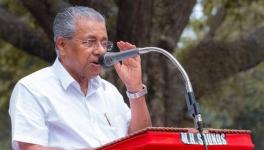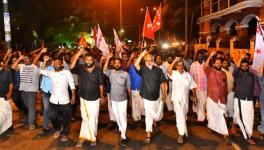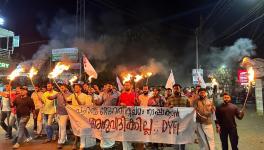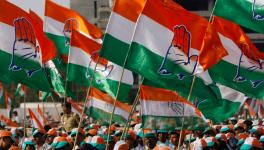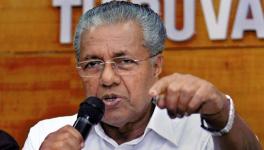Lessons from Bengal: CPI(M) in Kerala Seeking to Avoid Pitfalls of Being in Power for Long
The people of Kerala have given a historic mandate to the ruling Left Democratic Front government led by the Communist Party of India (Marxist). They have decided to return the ruling party to power for a second consecutive term for the first time in the last four decades. However, a new controversy has erupted with the swearing-in of the second LDF Cabinet. The principal alliance partner, i.e., the CPI(M) has decided not to retain any of its previous cabinet ministers, including the very popular and highly successful K.K. Shailaja, also known as Shailaja Teacher. The other major alliance partner, the CPI, has also followed suit. Only Chief Minister Pinarayi Vijayan, who is not expected to continue in office after this second consecutive term, has been retained.
Earlier, citing a party policy of not fielding any MLA with a consecutive tenure of two terms in the 2021 election, the CPI(M) had not given a ticket to the very competent former Finance Minister, Dr. T.M. Thomas Isaac. This all seems strange in the Indian political scenario, where electoral victories are used to whitewash administrative incompetence and a successful tenure yields individual accolades and an entitlement to continue in office. The result, more often than not, is political arrogance and/or complacency. Either the electorate is taken for granted or the party, and the corporate media vilifies or glorifies politicians accordingly.
None of this is in Kerala this time. In a state, where anti-incumbency creeps up faster than the monsoon, and where the United Democratic Front (UDF) and the LDF alternatively form governments after every five years, this sudden continuity in regime is being seen both as a boon and a curse. It is a boon because the LDF policies can now be implemented much more rigorously and the administration will achieve a much-needed stability after a long time.
At the same time, the pitfalls of being in power for long will manifest too. Proclivities for corruption and possible political stagnation will have to be consciously avoided. The CPI(M) in Kerala seems to have found a way out of this. By inducting fresh blood within the ministry and the legislative assembly, it seeks to bring up an alternative leadership from within the party, who after the end of this term will have a valuable experience of public administration under their belt. The party does not wish to retain the previous ruling establishment so as to neutralise anti-incumbency even before it is able to gather force. Although the government has been re-elected, the people will be made to feel that this is another fresh start, albeit with the same policies.
Unlike other political parties in India, the CPI(M) in Kerala is treating another tenure in government as not an end in itself but as a means to further expand the party organisation and transform society bottom-up. Assembly seats and ministerial berths are to be treated as opportunities to work in the parliamentary set-up and not as plum promotions for power-hungry politicians. Putting the party above the individual politician is something the corporate media is not accustomed to seeing a lot in Indian politics, which is overwhelmingly dominated by regional satraps and autocratic supremos.
However, as a communist party, the CPI(M) is learning from past experiences elsewhere in the country. For a party, which even has a provision of ‘going underground’ in case it is declared illegal in the constitution, keeping an alternative leadership ready for hard times is a matter of survival. The decision of the CPI(M) in Kerala cannot be fully comprehended unless it is set in relief against the experience of West Bengal—former red fortress where the communists governed for about three and a half decades continuously—and the anxieties and lessons it generated.
Within a decade of being voted out of power in West Bengal, the once mighty CPI(M) has been denied any representation in the state legislative assembly. This unfortunate electoral rout and sustained political downfall since 2008 has been attributed to many factors, of which arguably the most potent one has been massive anti-incumbency against the erstwhile CPI(M)-led Left Front government. The Front’s dominance in Bengal politics had given rise to run-of-the-mill aphorisms cleverly used by its unscrupulous and opportunistic political opponents such as ‘the communists never leave positions unless they leave this world.’ Over the course of three and a half decades, sections of the party had grown complacent with some ministers, MLAs and local party leaders appearing to be somewhat dormant in their respective positions. So much so, that its immensely successful programme of land reforms, decentralisation of the three-tier panchayati raj, and the achievement of social peace ceased to matter to its opponents, who had now found an effective new stick to beat the Left with.
This is not to say that the CPI(M) did not have competent and popular ministers—old and young—some of whom had achieved legendary status for their personal incorruptibility and dedication to the people’s cause, and yet, stability within the leadership was incessantly projected as ‘stagnation’ by the corporate media. The anti-Left forces left no stone unturned to run political slander campaigns against senior ministers who had to continue in office, often against their own wishes and in spite of failing health, because of their indispensable experience. Consequently, a newer crop of alternative leadership took more time to emerge than what would have been considered ideal.
The memories of the unstable United Front governments of the late sixties and the early seventies, and those of the ensuing targeted political violence against the communists had convinced the CPI(M) in Bengal that conserving the Left Front government—the weapon of the masses forged by long struggle—was to be given utmost priority. In the face of consistent attempts at destabilising the Left Front government by ascendant right-wing forces and the neoliberal onslaught in the nineties, defensive inertia crept up. Innovations in governance and leadership happened rather slowly and the dynamism required became blunted.
It is precisely this ill-fated trajectory that the CPI(M) in Kerala is seeking to avoid now that it has been re-elected to power. Compulsory rotation in leadership and cooling-off periods for even successful leaders are its tools to counter conservatism within the party. At the same time, this is also supposed to be translated into an effort at democratising political opportunities among the party members and a process of continuously creating new leaders. The party is not just banking on its past record but also investing substantially in its future. It is determined to not repeat the mistakes of Bengal or give its opponents any ammunition for a counter-assault. K.K. Shylaja has not been ‘dropped’ from the cabinet; she, like other leaders, is being prepared for an ever-greater role within the party and perhaps the government in the future. A good case in point to substantiate this prediction is to look at the political career of P. Rajeev. Rajeev had shot to fame as a parliamentarian par excellence during his tenure as a CPI(M) nominee from Kerala in the Rajya Sabha. So much so, that even other political parties had expressed intense dissatisfaction when he was not given another Rajya Sabha term, which he surely deserved, and was called back by the party to serve as a district committee secretary in his home state. This time, he has been included in the LDF cabinet.
For the likes of Shailaja and Rajeev, ministerial portfolios, membership of the Parliament or for that matter, leadership of party committees are merely political assignments handed out by the party. The objective of working for the people remains unchanged as does the larger goal of transforming society. None of them have ever expressed the slightest displeasure over these matters. This is because they view themselves not as party leaders or party workers but as partisans first—charged with the responsibility of carrying out the party’s tasks to the best of their abilities.
In an era of atomised politics, where identity wars are shaping the political discourse continuously, doing class politics demands a collective and disciplined approach, best embodied in the actions of people like K.K. Shailaja and P. Rajeev. In the words of the latter, no matter how big a leader becomes, it is always they who are representing the party and not the other way round. The CPI(M) in Kerala is taking the lessons from the Bengal experience very seriously. It seems that other left-wing political parties in India can also take a leaf or two out of its book, including the CPI(M) in Bengal.
Get the latest reports & analysis with people's perspective on Protests, movements & deep analytical videos, discussions of the current affairs in your Telegram app. Subscribe to NewsClick's Telegram channel & get Real-Time updates on stories, as they get published on our website.










